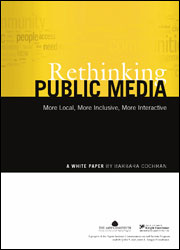Citizens Could Be Better Served with More Local, Inclusive and Interactive Public Broadcasting Systems, Missouri Journalism Professor Proposes
Washington, D.C. (Dec. 8, 2010) — Public broadcasting systems should become more local, inclusive and interactive if they are to be relevant to their communities, according to a white paper written by Barbara Cochran, the Curtis B. Hurley Chair in Public Affairs Journalism at the Missouri School of Journalism.

The paper, “Rethinking Public Media: More Local, More Inclusive, More Interactive,” offers five broad strategies and 21 specific recommendations to reform public media at a time when government funding for public broadcasting is hotly debated. The key strategies include strengthening local news operations, sharing digital platforms among public entities, recruiting more diverse workforces and reforming public media structures.
In particular, Cochran’s plan includes a recommendation for news outlets to partner with journalism schools as one way to promote digital literacy in underserved communities.
“As local newspapers lose readers and resources, public media is poised to fill the gap,” said Cochran. “Public broadcasting is highly trusted in comparison to other media sources and public radio is one of the few traditional sources of news with a growing audience. But public media leaders must embrace change to convince government and philanthropic supporters and, most importantly, their communities that they have a new vision worthy of their investment.”
Cochran’s proposals are aimed at implementing the public media recommendations of the Knight Commission on the Information Needs of Communities in a Democracy. The Aspen Institute Communications and Society Program and the John S. and James L. Knight Foundation released Cochran’s paper today.

A former journalist and news executive who led both public and commercial newsrooms, Cochran joined the School’s Washington Program as Hurley Chair in September 2010. In this role, she engages in programs of research, consulting and training aimed at improving the practice of journalism. Among her previous positions, she served as vice president of news for NPR and oversaw the creation of “Morning Edition.”
The policy paper is the third in a series focused on implementing the Knight Commission’s 15 recommendations for creating healthy informed communities across the country. The paper was released on Dec. 8, 2010, and discussed at a roundtable including leaders and critics of public media and policymakers. The paper and an online video of the roundtable are available at www.knightcomm.org.
Updated: May 19, 2020